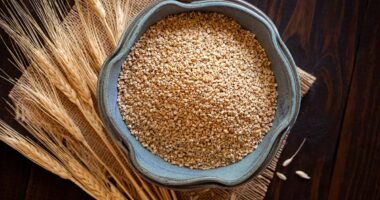The liver is a vital organ responsible for various metabolic functions, including detoxification. While the detrimental effects of alcohol on the liver are well-known, it is important to be aware that certain foods can also cause significant harm. Research has shown that the consumption of specific foods can lead to liver damage, potentially surpassing the impact of alcohol. These 10 foods that can cause more damage to your liver than alcohol include:
1. Excess protein
Excess protein intake can lead to various health issues, including elevated blood lipids, heart disease, intestinal discomfort, dehydration, nausea, fatigue, headaches, and more. The recommended dietary allowance for protein is 0.8 g protein/kg body weight/day for healthy adult male and female subjects. Athletes, people with physically demanding jobs, and pregnant or breastfeeding people may require more protein. However, most people in the U.S. meet or exceed their protein needs, especially from meat, poultry, and eggs. Excessive consumption of red meat, which is high in protein, can lead to various liver-related issues, including fatty liver diseases. It’s important to maintain a balanced diet and avoid excessive consumption of protein to protect your overall health[1].
2. Aerated or fizzy drinks
Aerated or fizzy drinks can be bad for the liver. Regular consumption of these drinks, especially those with high sugar content, can lead to fatty liver disease, making you susceptible to heart disease and cirrhosis. The sugar in these drinks can get converted into fat that’s stored in liver cells, leading to fat buildup in the liver over time.
Additionally, artificial sweeteners in diet soft drinks can impact the gut microbiota composition, which in turn can impact metabolic processes and potentially contribute to liver-related conditions. It is recommended to limit or avoid consuming aerated drinks and opt for healthier alternatives, such as coconut water, lime water, buttermilk, or fresh fruit juices[2].
3. Herbal supplements
Herbal supplements are often considered for liver health, but it’s essential to approach them with caution. While some herbs like milk thistle, dandelion, and artichoke are associated with improved liver health, others can be harmful. Research has linked certain herbal supplements to liver damage, with some cases even leading to acute liver failure. For instance, kava kava, a herb used for menopause symptoms and relaxation, has been associated with hepatitis and liver failure. Therefore, it’s crucial to consult a healthcare provider before taking any herbal supplement, especially if you have a liver condition[3].
4. Processed meats
Processed meats are meats that have been modified to extend their shelf life or change their taste. They include deli meats, bacon, hot dogs, sausages, salami, and canned meat. The processing methods can include salting, curing, fermentation, smoking, and the addition of chemical preservatives. Processed meats have been linked to health complications such as cancer and heart disease, and their consumption should be limited. The American Cancer Society recommends choosing protein foods such as fish, poultry, and beans more often than red meat, and for people who eat processed meat products to do so sparingly, if at all [4].
5. Fried foods
Fried foods can be unhealthy for the liver. They are high in saturated fat, which can lead to increased liver fat and cause a condition called fatty liver. Regular consumption of fried and processed foods can cause significant changes in liver enzymes, which can ultimately lead to liver failure. Therefore, it is advisable to consume fried foods in moderation to maintain a healthy liver[5].
6. Sugary foods
Excessive consumption of sugary foods, especially those containing added sugars like high-fructose corn syrup, can be detrimental to liver health. Research has shown that the liver processes fructose to make fat, and consuming too much-refined sugar and high-fructose corn syrup can lead to a fatty buildup in the liver, potentially causing non-alcoholic fatty liver disease (NAFLD) and other metabolic abnormalities. Therefore, it is advisable to limit the intake of foods with added sugars to maintain a healthy liver[6].
7. Excessive salt
Excessive salt intake can be dangerous to your liver. Studies have shown that a high-salt diet can lead to liver damage, including misshapen cells, higher rates of cell death, and lower rates of cell division, all of which can lead to liver fibrosis. Additionally, high salt intake has been associated with nonalcoholic fatty liver disease (NAFLD) and insulin resistance, which can contribute to the development of fibrosis. So limit your salt intake to protect liver health [7].
8. Fatty foods
Foods high in saturated fat, such as French fries, burgers, and pizzas, can make it harder for the liver to function properly and contribute to weight gain, leading to fat buildup in the liver. It is recommended to avoid or limit the consumption of fatty foods to maintain a healthy liver. Instead, one should consume foods that are high in fiber, antioxidants, and unsaturated fats, such as leafy greens, nuts, whole grains, and fatty fish[8].
9. Excessive red meat
Excessive consumption of red meat can be unhealthy for the liver. Red meat contains saturated fat, which can induce fatty liver and lead to inflammation and insulin resistance, contributing to fat accumulation in the liver. Additionally, breaking down proteins from red meat is taxing for the liver and can lead to various liver-related issues, including fatty liver diseases. Therefore, it is advisable to limit red meat intake and opt for healthier alternatives to support liver health[9].
10. Contaminated food
Contaminated food can be unhealthy for the liver due to the potential presence of various pathogens and chemical contaminants. Hepatitis A virus, for example, can be transmitted through contaminated food and water, leading to long-lasting liver disease.
Additionally, some parasites, such as fish-borne trematodes, can be transmitted through food and cause liver damage. Furthermore, chemical contamination in food can lead to acute poisoning or long-term diseases, including those affecting the liver.
Therefore, consuming contaminated food can pose significant risks to liver health, making it important to practice safe food handling and preparation measures to prevent foodborne illnesses [10, 11].
ALSO READ: 11 Most Common Foods That Damage Your Kidneys









